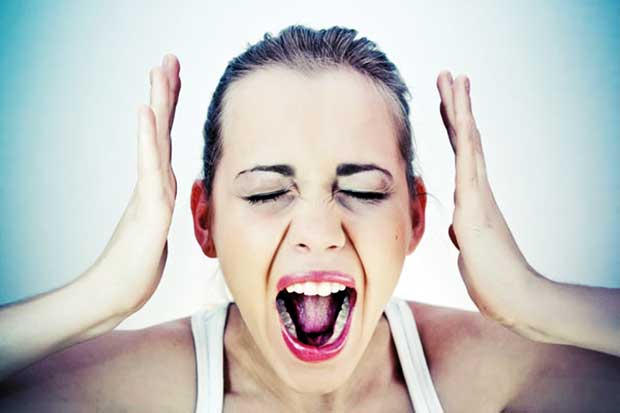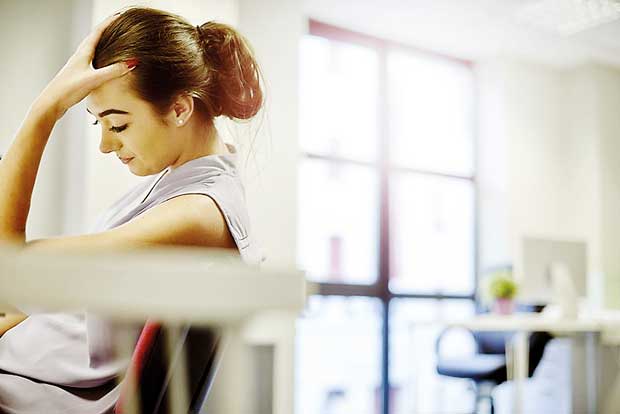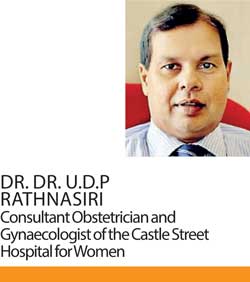12 Jan 2018 - {{hitsCtrl.values.hits}}

 How many times have you used the phrase, “Sorry, I must be PMSing,” to escape a tough situation where you acted irritably or unfairly. But how much do you actually know about PMS? Did you know, for example, that while around 20 to 30 percent of the women of fertile age are reported to be suffering from this condition, actual figures are believed to be higher? To obtain more information about this well-known condition that still has many obscure areas, the Health Capsule consulted Dr. U.D.P Rathnasiri, Consultant Obstetrician and Gynaecologist of the Castle Street Hospital for Women.
How many times have you used the phrase, “Sorry, I must be PMSing,” to escape a tough situation where you acted irritably or unfairly. But how much do you actually know about PMS? Did you know, for example, that while around 20 to 30 percent of the women of fertile age are reported to be suffering from this condition, actual figures are believed to be higher? To obtain more information about this well-known condition that still has many obscure areas, the Health Capsule consulted Dr. U.D.P Rathnasiri, Consultant Obstetrician and Gynaecologist of the Castle Street Hospital for Women.
Definition
PMS, short for Pre Menstrual Syndrome, stands for a condition where a series of psycho-somatic symptoms which occur prior to menstruation in a pre-menopausal woman. The term ‘psycho-somatic’ is used because the issues that a woman suffering from the condition will undergo can be both physical as well as mental. These symptoms could appear at anytime from the point of ovulation to the starting of menstruation.
The cause
A woman’s body experiences hormonal variations each month with her menstrual cycle. These changes are especially highlighted after ovulation, which is the process of releasing of the unfertilized egg by the ovary. These changes bring about physical and emotional changes, which give rise to these symptoms.

How do they present?
Physical symptoms could present as headache, breast tenderness, bloating, fluid retention, joint pain, lower abdominal pains and cramps and other non-specific symptoms which give her pain.
Psychological problems most often present as mood changes. Irritability, feeling down and depressed, lack of interest in things she normally enjoys, loneliness, agitation and lack of sexual desires can happen during her period due to the hormonal changes. This could further go on to affect adversely on the person’s day-to-day life, keeping them away from normal activities, school and jobs due to severe symptoms.

All these symptoms can be roughly categorized into mild, moderate and severe.
PMS is a disease very specific to the reproductive age group of women, and it’s been found that the symptoms increase closer to the menopause in middle aged women. Another bad effect of PMS is that in addition to altering moods, it also worsens preexisting conditions like depression, and asthma.
When should we seek medical treatment?
This depends on various factors like how severe the problem is and how much it affects your day-to-day life. Most patients with mild symptoms do not need medical treatment. Sometimes just a simple analgesic may bring relief. But patients with severe disease will benefit from seeking specific treatments.
Treatment
Treatment is not for everyone. First we have to confirm that these symptoms are due to PMS and not related to another underlying cause. Usually, if the symptoms appear for at least three cycles, we can consider that it’s due to PMS. Treatment is not the same for everyone and has to be tailor-made for the need of the individual. Sometimes a painkiller like Aspirin, Ibuprofen, and Diclofenac Sodium may benefit.
At other times she may need hormonal treatment like Oral Contraceptive pills. They prevent the process of ovulation; the release of the egg from the ovary, preventing most symptoms of PMS from occurring.
Specific symptoms that trouble the patient will also be addressed, like giving Diuretics to reduce bloating, and prescribing antidepressants in case of severe mood alterations. Pre-existing conditions that are aggravated by PMS, like asthma, will have to be addressed separately.
In the condition called, Pre-Menstrual Dysphoric Disorder (PMDD), which is the severe form of PMS, the symptoms affect the patient in a way that her activities of daily living can’t be continued. In this case, they will need treatment earlier and more severe types of treatment like a combination of treatment. In place of Oral Contraceptive pills, we also prescribe more advanced treatments like GnRH analogues, which prevent ovulation at the brain pituitary level. These drugs can’t be continued long-term, but will be effective in most cases.
Is medication the only option?
Sometimes, supplementation using vitamins and alternative medicine like Ayurveda and acupuncture may work with some women. At other times engaging in activities like yoga, exercises and medication may help. Incorporating some form of relaxing activity that provides distraction from focusing on the symptoms like dancing or gardening for example have known to be beneficial.
The important thing is to continue with whatever that proves beneficial, rather than alternating treatment frequently to find relief.
Final message
Women should not suffer from PMS. They should seek help. Help does not always mean medication. It may mean emotional support, engaging in uplifting activities, not being isolated and changes in lifestyle, exercise and weight loss. As I said, this disease as well as the treatment that works is individualized in each case. The important thing is to know that treatments are available and to find out what works for you.
23 Dec 2024 26 minute ago
23 Dec 2024 31 minute ago
23 Dec 2024 1 hours ago
23 Dec 2024 2 hours ago
23 Dec 2024 3 hours ago